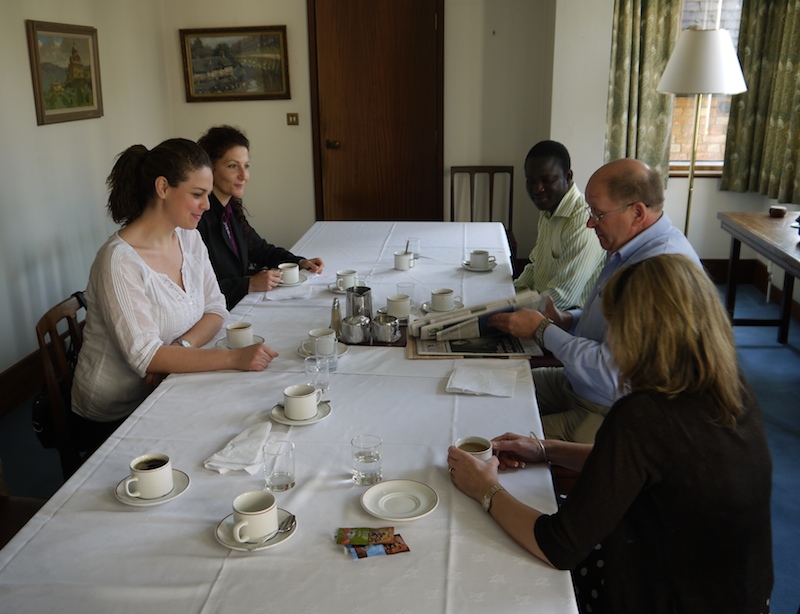Seen on the beach at Inch, Co. Kerry, this afternoon. Like a French vaudeville villain, I thought.
The naivete of (some) UK universities

David Mitchell had a terrific piece in the Observer triggered by stories that up to 10 British publicly-funded universities are in talks with Carl Lygo, the CEO of BPP (Britain’s first for-profit ‘university’), about possibility of running the business side of these institutions by going into “partnership” with them.
The idea is that they’d still make all the academic decisions, while BPP would deal with the admin. Mitchell has this to say about the proposition: “There is little doubt that state funding changes an institution’s attitude to money and can increase its propensity for waste.”
But…
I think it’s a big jump from that observation to the current orthodoxy that the public sector’s flabby inefficiency and the private’s dynamic productivity are inevitable and universal – that the private sector possesses some kind of magic which, by dint of being paid by the state, no one in public service has access to; that the private sector is always brilliant and the public always useless.
I suspect Lygo of subscribing to this view when he says: “We have got a lot of universities in the UK and not all are in a strong financial position… the private provider would add expertise in the back-office functions.” What expertise? Expertise in administering, say, Bristol University that the people currently administering Bristol University don’t possess but a new company that’s never done it before is going to be brimming with? Won’t they just employ the same people to do the job but pay them less or sack a few? Is that what he means by expertise?
It’s not expertise, it’s ruthlessness, it’s the prioritisation of profit. What Lygo is offering people running universities is the opportunity to divest themselves of many of the problems inherent in their jobs. If you don’t want to take the tough decisions, he’s saying, if you doubt you’ve got the backbone to make the efficiency savings, then we’ll handle them for you. Pass your troubles on to those of us untroubled by conscience. Not only would this be a dereliction of the universities’ duty, it would also help perpetuate the myth of the private sector’s omnipotence and the public’s doltish money-burning idiocy.
The private sector caused the credit crunch, the financial crisis, the global recession. The public sector bailed out the banks and brought the world back from the brink of ruin. When our railways were in public hands, they were shabby, unreliable and loss-making. In private hands, they still are but public money ends up in the hands of shareholders and the tickets cost vastly more. The NHS is the most efficient health service of its peers despite having, up till now, much less private sector involvement than they do. The armed forces remain in the public sector and people seldom have cause to criticise their efficiency or commitment.
What Mitchell doesn’t mention, but Howard Hotson did in his splendid piece in the LRB, is that BPP is an offshoot of Apollo, the US Corporation which owns the ‘university’ of Phoenix.
In 2004, a scathing report issued by the US Department of Education concluded that Phoenix, as the Chronicle of Higher Education put it, had a ‘high-pressure sales culture’ that intimidated recruiters who failed to meet targets and encouraged the enrolment of unqualified students – in short that it rewarded ‘the recruiters who put the most “asses in classes”’. Apollo illegally withheld the report, but it was leaked and the group’s value on the stock market crashed. A suit was brought alleging that its management had ‘disseminated materially false and misleading financial statements in an effort to inflate its stock price and attract investors’.
In 2006 the company’s controller and chief accounting officer resigned amid allegations that the books had been cooked; in 2007, the Nasdaq Listing and Hearing Review Council threatened to withdraw Apollo’s listing from the stock exchange; in 2008, a US federal jury in Arizona found Apollo guilty of ‘knowingly and recklessly’ misleading investors, and instructed the group to pay shareholders some $280 million in reparations. Apollo appealed, but the appeal was rejected by the US Supreme Court on 8 March this year.
In the face of strenuous lobbying from the for-profit university industry, the Obama administration is now reversing the regulatory changes of the Bush years that allowed this bonanza. It has just been revealed that attorney-generals in ten states are investigating the University of Phoenix ‘for possible deceptive practices in its student recruiting and financing’ dating back to 2002. It looks like the party may be over, at least for the Apollo Group. Enrolment at Phoenix dropped by 42 per cent in the last three months of 2010. In January the group conceded that it expects applications to drop by another 40 per cent in the first quarter of 2011.
So this is the group that is going to offer its commercial nous to the UK higher education sector? “Is it possible”, asks Hotson, “that [David] Willetts just doesn’t know what the Apollo Group was up to at the University of Phoenix? Or does he imagine that for some reason the same thing couldn’t happen here?”
I’ve seen too much of universities over my professional career to think that their administration and management couldn’t be improved. But the idea that an outfit like BPP has anything to contribute to their management is, well, insane.
Which means, of course, that it is now quite probable.
Why isn’t Amazon stamping out Kindlespam?
Further to my Observer column about Kindlespam, I’ve been brooding on the subject.
The most obvious question is why Amazon doesn’t do something about it. After all, the Kindle is now the company’s key product, and the stench of corruption coming from Kindlespam must pose a strategic threat. Users can’t do much about it — other than by ignoring the avalanche of fake ‘eBooks’ on the site. And it’s very difficult (if not virtually impossible) for an author who suspects that his or her content is being ripped off to check, because she can’t inspect the content without buying and downloading the suspected rip-off. So any comprehensive trawl for infringing content would be prohibitively expensive and tedious. The only outfit that can check stuff before it’s published on the site is Amazon. So why aren’t isn’t the company doing it?
At first, I thought that Amazon’s rationale might be similar to the one Google takes on the issue of infringing or objectionable YouTube content: given that 48-hours’-worth of video is being uploaded every minute, it simply isn’t feasible to pre-scan stuff before it’s published. But Google will take it down on receipt of a complaint. That won’t get Amazon off the Kindlespam hook for two reasons: (1) Compared with video, pre-scanning of text is perfectly feasible, and computationally not that difficult; Amazon could easily do it. (2) Detection of infringing content in Kindlespam by rights holders is very difficult for the reasons outlined earlier, so while a take-down-upon-complaint policy is perfectly feasible, complaints will be much less frequent than they are on YouTube.
So we’re left with a puzzle. Pre-scanning for crap, spam and infringing content in Kindlespam is perfectly feasible — and indeed only Amazon can do it effectively. Yet it does not do it. Why?
One answer (suggested in my column) is that the company is making too much money from Kindlespam. (After all, Amazon get a 30 per cent slice on every bit of Kindlespam sold.) But another answer has just occurred to me. (I’m slow on the uptake.) If Amazon did pre-scan all the self-published stuff on the Kindle store, then it might have to take legal responsibility for the resulting content. It might have to take on the liabilities of a publisher, in other words.
So at the moment, Amazon is trying to have it both ways. It provides a platform (Kindle self-publishing) from which it rakes in dosh, but takes no responsibility for the avalanche of crap that the platform enables. Experience with conventional spam suggests, though, that this can’t continue: in the end the textual bindweed will choke the plant. And then what will Amazon do?
LATER: Behind all this is the whole problem of so-called content-farms — some of which are now probably using the Kindle as one of their outlets. They have been a scourge of the Web for a while, because essentially they are parasitic on Google’s AdSense system. The company has finally responded to the problem in classic Google style — with an algorithm, codenamed Panda. Virginia Heffernan has a good piece about this in today’s NYT. The headline — “Google’s War on Nonsense” — says it all.
Remembering Maurice Wilkes

Today, the Cambridge Computer Lab will be honouring Maurice Wilkes with an afternoon of talks and reminiscences. I’m looking forward to it. He was such an amazing, practical man.
Here’s the programme:
Andy Hopper: Introduction
Martin Campbell-Kelly: Beginnings
David Barron: Pioneering
David Hartley: Service
Andrew Herbert: Research
Don Gaubatz: America
Andy Harter: Industry
Andy Hopper: Back to the Lab
Discussion
Kindlespam
This morning’s Observer column.
At first sight, it seems magical. At a stroke, all those tiresome gatekeepers – those self-important agents, editors and publishers who stood between you and recognition – are abolished. Suddenly, the world can see your hitherto unrecognised talent in all its glory. Isn’t technology wonderful?
Er, up to a point. This ebook technology has proved so successful that Amazon now claims to be selling more electronic publications than conventional printed ones. The company is clearly surfing a wave. According to one industry expert, for example, nearly 2.8 million non-traditional books, including ebooks, were published in the United States in 2010, while just more than 316,000 traditional books came out. That compares with 1.33 million ebooks and 302,000 printed books in 2009.
Impressive, eh? It’s only when one peruses the cornucopia of literary productions available on the Kindle store that one detects the first scent of rodent…
Closing in
Spotted in a friend’s rose garden this morning.
Champagne wheel
Breakfast seminar
Breakfast seminar this morning for my Wolfson Press Fellows given by Bob Satchwell (centre right), Director of the Society of Editors.
We had a lively discussion about, among other things, super-injunctions, during which Bob reminded me of something that the eminent judge Lord Woolf once said (I think in a House of Lords debate). The context was an assertion (by me) that there was no ‘public interest’ defence for tabloid coverage of the sex lives of footballers, but Woolf said that there was also a wider public interest in having newspapers that were commercially successful. Given that the public apparently craves news of footballers’ sex lives, and that tabloids pander to that craving, perhaps the public interest issue is more complex than I had thought.
Discuss, as they say in philosophy exams.
Serried glassware
Lined up awaiting guests to the launch party for Nicci and Sean’s new book.
Just in case…
29 WAYS TO STAY CREATIVE from TO-FU on Vimeo.
I know you don’t need these tips, but just in case…





